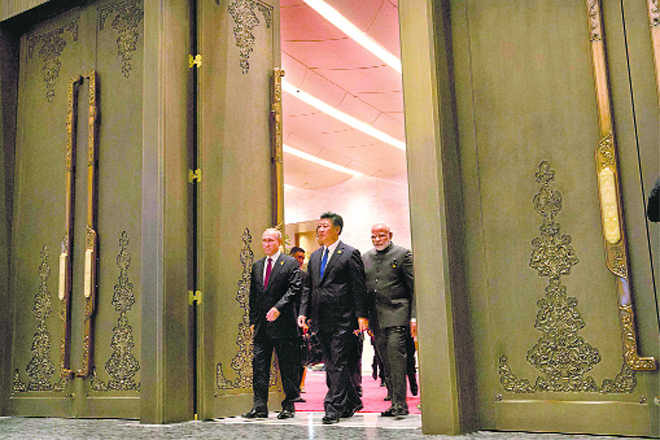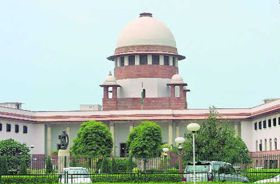
Don’t be left behind: India needs to refresh its world view.
MK Bhadrakumar
JAPAN has decoupled from the Indian carriage and moved on to collaborate with China’s OBOR. Prime Minister Shinzo Abe made the stunning announcement on December 4 at a high-level Japan-China Track II event in Tokyo: ‘Meeting robust infrastructure demand in Asia through cooperation between Japan and China will contribute greatly to the prosperity of Asian people, in addition to the economic development of the two countries.’
Japan has drawn up the guidelines for funding OBOR projects through government-backed financial institutions to promote cooperation between Japanese and Chinese companies with focus on industrial modernisation and infrastructure. The Nikkei Asian Review reported that the cooperation ‘may entail large-scale infrastructure projects managed jointly by Chinese and Japanese private companies’ and involving European partners. India finds itself as the only Asian country to oppose the OBOR, China’s flag ship foreign policy initiative, which is identified with President Xi Jinping and enshrined in that country’s constitution.
There couldn’t be a more poignant backdrop to the meeting of the Russia-India-China (RIC) trilateral at foreign minister level taking place in Delhi today. India has not been a votary of ‘triangular diplomacy’, a term coined by Henry Kissinger to describe the pull and push of co-existence and confrontation between the US, the Soviet Union and China during the Cold War era. But the RIC is an entirely different paradigm predicated on consensus, cooperation and convergence as regards the world of tomorrow. None of the RIC countries ever drove a wedge between the other two or exploited any frictions in the relations between the other two.
The RIC meeting takes place at a juncture when the Sino-Russian relationship is at its highest point in history. Russia is no longer the dominating Eurasian power, but there is political will in Moscow and Beijing to prioritise their equal relationship based on mutual respect and benefit and to add content to it. Trade is booming. Russia does not become a factor in the dynamics of China’s relations with the US. The ‘win-win’ works splendidly. Neither side is seeking a military alliance nor makes demands on the other side. Yet, the gyre of cooperation and coordination is steadily widening while each side accords to the other a wide berth to pursue its self-interests.
Thus, China gets along wonderfully well with Ukraine or Poland and understands the raison d’etre of the Russo-Japanese ‘thaw’ and the robustness of the Russo-Vietnamese ties. It is possible to say that they significantly contribute to each other’s ‘strategic depth’, such as over Syria or the South China Sea. The point is, the strategic communication is very dense. China even has a unique institutionalised exchange at the level of the Director of the General Office of the Communist Party of China Central Committee (headed by Li Zhanshu who was elevated as member of the politburo standing committee at the recent party congress) with the Chief of Staff of the Presidential Executive Office in the Kremlin.
India too would have significantly enhanced its strategic depth and foreign policy resilience if only it had a relationship with China that Russia attained. Russia and India began their ‘normalisation’ with China at roughly the same time — second half of the 1980s. (India had a window of opportunity earlier when Mao smiled at Brajesh Mishra in 1970, but, alas, that couldn’t be pursued because of the East Pakistan developments and the gathering storms and/or the geopolitical shadow cast by the Sino-Soviet schism that had peaked in the conflict on the Ussuri river in 1969.) Historically, Russia’s relations with China were far more complicated than India’s. Chinese territories were annexed by Tsarist Russia as recently as the second half of the 19th century and constitute the southern part of Russian Far East. Prior to the 1600s, China and Russia were on opposite ends of Siberia! The spirit of pragmatism morphing into strategic behaviour in the 1991 Sino-Soviet border agreement is striking.
However, to cut the story short, following Boris Yeltsin’s first official visit to China in December 1992, Moscow and Beijing institutionalised a system of twice-a-year summit meetings at the highest level ensuring sustained strategic communication, which today provides the underpinning of China-Russia comprehensive strategic partnership of coordination. Suffice to say, India failed miserably where post-Soviet Russia brilliantly succeeded. Plainly put, India’s reset of its post-Cold War foreign policy compass was fundamentally flawed. Aside our feudal mindset that disputes or differences are best ‘managed’ rather than resolved while mundane life must move on, three horribly wrong assumptions clouded our thinking during the historic reset that became necessary in the ’90s following the end of the Cold War and the dissolution of the former Soviet Union.
First, India convinced itself of the dawn of the New American Century, which was the triumphalist thesis of American discourses. That, in turn, bred India’s subsequent ‘unipolar predicament’. However, as it turned out, history had not really ended. The disappearance of the Cold War confrontation and the disbandment of the USSR, paradoxically, exposed the latent contradictions in capitalism. (Paul Kennedy predicted in 1989 in The Rise and Fall of the Great Powers, his work of Toynbeean sweep, the US’ atrophy and decline.) Second, India wrote off Russia as a consequential world power. This was appalling because India wasn’t lacking insight into the profundity of the Russian genius historically to overcome adversities and regenerate, the formidable levels of social formation and the technological and scientific heights the Soviet state had scaled, or that country’s intellectual reserves. Now, was this sophistry — for, Russia’s resurgence put a lance through the heart of our ‘unipolar predicament’? There are no easy answers. Third, India assumed that China’s rise was far from assured, considering the obstacles on its path. Thus arose the quest to ‘catch up’ with China and become the ‘counterweight’, a notion encouraged in no small measure by interested third parties. This eventually bred a sense of ‘rivalry’ warping the mindset (which is irrational because you can rival only your peers).
Who owns the responsibility — the pundit who succumbed to brainwashing, the interest groups that mushroomed in the wake of globalisation, or the policymaker who lacked a sense of history? To be sure, India’s inability (or refusal) to explore RIC’s potential has a dark and brooding background to it. The RIC’s uniqueness lies in its potential to be the vehicle to regenerate India’s foreign policy. Russia’s benign presence inside the cabin helps. If Abe had an ‘RIC option’, he’d have grabbed it with both hands as the compass to navigate Japan toward a stable relationship with China (and Russia). He’d have proposed annual RIC summit meetings.
The writer is a former ambassador



























